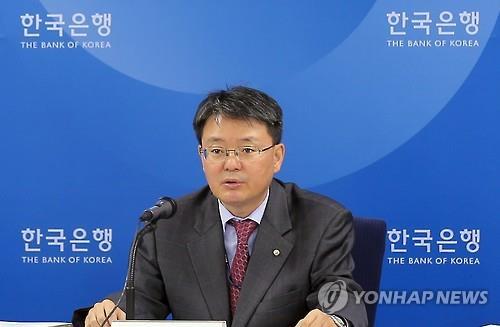- California Assembly OKs highest minimum wage in nation
- S. Korea unveils first graphic cigarette warnings
- US joins with South Korea, Japan in bid to deter North Korea
- LPGA golfer Chun In-gee finally back in action
- S. Korea won’t be top seed in final World Cup qualification round
- US men’s soccer misses 2nd straight Olympics
- US back on track in qualifying with 4-0 win over Guatemala
- High-intensity workout injuries spawn cottage industry
- CDC expands range of Zika mosquitoes into parts of Northeast
- Who knew? ‘The Walking Dead’ is helping families connect
BOK voices reservations over Park’s quantitative easing offer
SEOUL, April 29 (Yonhap) — A senior official of South Korea’s central bank expressed his reservations on Friday over quantitative easing efforts recently proposed by President Park Geun-hye, saying that they should require public consensus.
“If the central bank has to play a fiscal role by making use of its money-minting authority, I think that there should be public or social consensus on it,” BOK deputy governor Yoon Myun-shik said in a meeting.
“No matter how urgent it might be, I think following due procedure is in line with what the BOK stands for… The due procedure here is to form a public or social consensus,” he added.
His remarks could be seen as thinly-veiled opposition to Park’s stance on quantitative easing and the possible role of the central bank in that process.
On Tuesday, Park said at a meeting with chief editors of major newspapers and broadcasters that it is time to “think positively” about Korean-style quantitative easing to help secure money needed to push for corporate restructuring deemed to be critical in revitalizing the economy.
A possible use of the central bank’s money-issuing authority has been cited as a way to provide state policy lenders leading the corporate restructuring drive with sufficient “ammunition.”
Critics, however, have raised worries over the government’s possible misuse of the money-issuing authority.
“The BOK also thinks that structural overhaul and corporate restructuring are key to beefing up our economic growth potential,” Yoon said. “But the currently discussed quantitative easing is to be different than the quantitative easing that BOK officials are usually talking about.”
Later in the day, BOK Governor Lee Ju-yeol told reporters that “discussions are necessary” on the sensitive matter.
The BOK also issued a statement reading Yoon’s remarks did not mean it would not play any role in the planned restructuring of some troubled firms here.
“Efforts are needed to elicit a public consensus to use our money-creating authority,” it stressed, effectively passing the ball to the National Assembly.
Chances are low that the opposition bloc will support Park’s offer to raise funds for the restructuring program via the BOK.
“If the central bank exerted its money-creating power (for that), it would bring about a controversy over damaging the independence of the Bank of Korea,” said Park Kwang-on, spokesman for the main opposition Minjoo Party.
Experts are divided over how to resolve the problem.
“Now is the time for the BOK to do something,” Yoon Chang-hyun, professor at the University of Seoul, said. “The BOK Act stipulates that it will play a role in financial stability. Unless the restructuring work is done properly, it may lead to instability in the financial system.”
But Park Chang-kyun, professor at Chung-Ang University, called for supplementary budgets to finance the restructuring program.
“The government should raise restructuring funds through an agreement between the ruling and opposition parties, which are united in the need for the restructuring work itself,” he said. “It’s difficult but it’s the right answer.”













